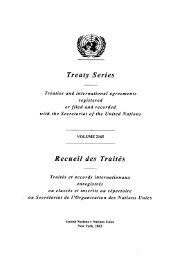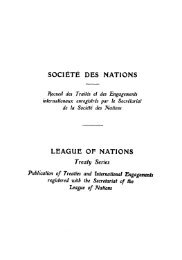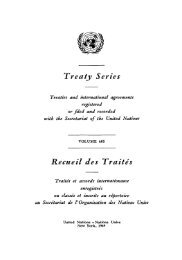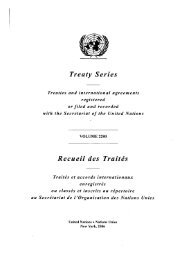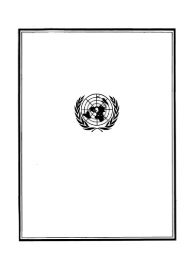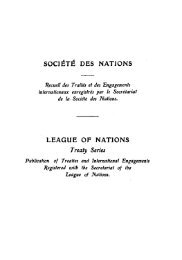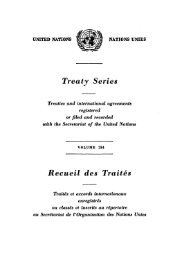- Page 1 and 2:
Treaty Series Treaties and internat
- Page 3 and 4:
Traites et accords internationaux e
- Page 5 and 6:
1976 United Nations-Treaty Series 9
- Page 7:
I Treaties and international agreem
- Page 10 and 11:
United Nations-Treaty Series e Nati
- Page 12 and 13:
6 United Nations-Treaty Series * Na
- Page 14 and 15:
8 United Nations-Treaty Series * Na
- Page 16 and 17:
10 United Nations-Treaty Series e N
- Page 18 and 19:
12 United Nations-Treat) Series e N
- Page 20 and 21:
14 United Nations-Treaty Series 0 N
- Page 22 and 23:
16 United Nations-Treaty Series e N
- Page 24 and 25:
18 United Nations-Treat) Series e N
- Page 26 and 27:
20 United Nations-Treaty Series * N
- Page 28 and 29:
22 United Nations-Treaty Series * N
- Page 30 and 31:
24 United Nations-Treaty Series * N
- Page 32 and 33:
26 United Nations-Treaty Series e N
- Page 34 and 35:
28 United Nations-Treaty Series e N
- Page 36 and 37:
30 United Nations--Treaty Series 9
- Page 38 and 39:
32 United Nations-Treaty Series * N
- Page 40 and 41:
United Nations-T'reat Series * Nati
- Page 42 and 43:
36 United Nations-Treaty Series * N
- Page 44 and 45:
38 United Nations-Treaty Series 9 N
- Page 46 and 47:
40 United Nalions- Treaty Series 9
- Page 48 and 49:
42 United Nations-Treaty Series * N
- Page 50 and 51:
44 United Nations-Treaty Series e N
- Page 52 and 53:
46 United Nations-Treaty Series e N
- Page 54 and 55:
48 United Nations- Treaty Series e
- Page 56 and 57:
50 United Nations-Treaty Series * N
- Page 58 and 59:
52 United Nations-Treaty Series 0 N
- Page 60 and 61:
54 United Nations-Treaty Series e N
- Page 62 and 63:
56 United Nations-Treaty Series * N
- Page 64 and 65:
58 United Ntioins- -ratiy Serie.s 0
- Page 66 and 67:
60 United Nations-Treaty Series 0 N
- Page 68 and 69:
62 United Nations-Treaty Series e N
- Page 70 and 71:
64 United Na'ions--Treaty Series *
- Page 72 and 73:
66 United Natioms-Treat.t Series e
- Page 74 and 75:
68 United Nations-Treat% Series e N
- Page 76 and 77:
70 United Nations-Treaty Series * N
- Page 78 and 79:
72 United Nations- -Treaty Series *
- Page 80 and 81:
74 United Nations-Treaty Series * N
- Page 82 and 83:
76 United Nations-Treaty Series 0 N
- Page 84 and 85:
78 United Nations-Treaty Series e N
- Page 86 and 87:
80 United Nations-Treaty Series e N
- Page 88 and 89:
82 United Nations-Treaty Series * N
- Page 90 and 91:
84 United Nations -Trealy Series o
- Page 92 and 93:
86 United Nations-Treaty Series e N
- Page 94 and 95:
88 United Nations-Treaty Series * N
- Page 96 and 97:
90 United Nations-Treaty Series * N
- Page 98 and 99:
92 United Nations-Treaty Series 0 N
- Page 100 and 101:
94 United Nations-Treaty Series o N
- Page 102 and 103:
96 United Nations-Treaty Series e N
- Page 104 and 105:
98 United Nations-Treaty Series * N
- Page 106 and 107:
100 United Nations-Treaty Series *
- Page 108 and 109:
102 United Nations-Treaty Series o
- Page 110 and 111:
104 United Nations-Treaty Series *
- Page 112 and 113:
106 United Nations-Treaty Series *
- Page 114 and 115:
108 United Nations-Treaty Series *
- Page 116 and 117:
II0 United Nations-Treaty Series e
- Page 118 and 119:
112 United Nations-Treaty Series *
- Page 120 and 121:
114 United Nations-Treaty Series a
- Page 122 and 123:
116 United Nations-Treaty Series o
- Page 124 and 125:
118 United Nations-Treaty Series *
- Page 126 and 127:
120 United Nations-Treaty Series *
- Page 128 and 129:
122 United Nations-Treaty Series *
- Page 130 and 131:
124 United Nations-Treaty Series *
- Page 132 and 133:
126 United Nations-Treaty Series e
- Page 134 and 135:
128 United Nations-Treaty Series *
- Page 136 and 137:
130 United Nations-Treaty Series *
- Page 138 and 139:
132 United Nations-Treaty Series *
- Page 140 and 141:
134 United Nations-Treaty Series *
- Page 142 and 143:
136 United Nations-Treaty Series e
- Page 144 and 145:
138 United Nations-Treaty ies 6 _NS
- Page 146 and 147:
140 United Nations-Treaty Series Ni
- Page 148 and 149:
142 United Nations-Treaty Series 9
- Page 150 and 151:
144 United Nations- Treaty Series *
- Page 152 and 153:
146 United Nations-Treaty Series, 9
- Page 154 and 155:
148 United Nations-Treaty Series 9
- Page 156 and 157:
150 United Nations-Treaty Series e
- Page 158 and 159:
152 United Nations-Treaty Series 0
- Page 160 and 161:
154 United Nations-Treaty Series *
- Page 162 and 163:
156 United Nations-Treaty Series *
- Page 164 and 165:
158 United Nations-Treaty Series &
- Page 166 and 167:
160 United Nations-Treaty Series e
- Page 168 and 169:
162 United Nations-Treaty Series *
- Page 170 and 171:
164 United Nations-Treaty Series e
- Page 172 and 173:
166 United Nations-Treaty Series *
- Page 174 and 175:
168 United Nations-Treaty Series *
- Page 176 and 177:
170 United Nations-Treaty Series e
- Page 178 and 179:
172 United Nations-Treaty Series *
- Page 180 and 181:
174 United Nations-Treaty Series *
- Page 182 and 183:
176 United Nations-Treaty Series 0
- Page 184 and 185:
178 United Nations-Treaty Series *
- Page 186 and 187:
180 United Nations-Treaty Series *
- Page 188 and 189:
182 United Nations-Treaty Series o
- Page 190 and 191:
184 United Nations-Treaty Series 9
- Page 192 and 193:
186 United Nations-Treaty Series e
- Page 194 and 195:
188 United Nations-Treaty Series *
- Page 196 and 197:
190 United Nations-Treaty Series *
- Page 198 and 199:
192 United Nation-Treaty Series o N
- Page 200 and 201:
194 United Nations-Treaty Series *
- Page 202 and 203:
196 United Nations-Treaty Series *
- Page 205 and 206:
No. 15036 UNION OF SOVIET SOCIALIST
- Page 207 and 208:
United Nations-Treaty Series * Nati
- Page 209 and 210:
United Nations- Treaty Series * Nat
- Page 211 and 212:
United Nations- Treaty Series 0 Nat
- Page 213 and 214:
United Nations- Treaty Series 0 Nat
- Page 215:
1976 United Nations-Treaty Series 9
- Page 218 and 219:
212 United Nations-Treaty Series 0
- Page 220 and 221:
214 United Nations-Treaty Series 9
- Page 222 and 223:
216 United Nations-Treaty Series e
- Page 224 and 225:
218 United Nations-Treaty Series e
- Page 226 and 227:
220 United Nations-Treaty Series *
- Page 228 and 229:
222 United Nations-Treaty Series e
- Page 230 and 231:
224 United Nations-Treaty Series 9
- Page 232 and 233:
226 United Nations-Treaty Series &
- Page 234 and 235:
228 United Nations-Treaty Series *
- Page 236 and 237:
230 United Nations-Treaty Series *
- Page 238 and 239:
232 United Nations- Treaty Series *
- Page 240 and 241:
234 United Nations-Treaty Series *
- Page 242 and 243:
236 United Nations-Treaty Series *
- Page 244 and 245:
238 United Nations-Treaty Series o
- Page 246 and 247:
240 United Nations-Treaty Series e
- Page 248 and 249:
242 United Nations-Treaty Series e
- Page 250 and 251:
244 United Nations-Treaty Series *
- Page 252 and 253:
246 United Nations -Treaty Series 9
- Page 254 and 255:
248 United Nations-Treaty Series e
- Page 256 and 257:
250 United Nations-Treaty Series e
- Page 258 and 259:
252 United Nations-Treaty Series e
- Page 260 and 261:
254 United Nations-Treaty Series *
- Page 262 and 263:
256 United Nations-Treaty Series e
- Page 264 and 265:
258 United Nations-Treaty Series o
- Page 266 and 267:
260 United Nations-Treaty Series o
- Page 268 and 269:
262 United Nations-Treaty Series *
- Page 270 and 271:
264 United Nations-Treaty Series e
- Page 272 and 273:
266 United Nations- Treaty Series *
- Page 274 and 275:
268 United Nations-Treaty Series *
- Page 276 and 277:
270 United Nations-Treaty Series *
- Page 278 and 279:
272 United Nations-Treaty Series 9
- Page 280 and 281:
274 United Nations-Treaty Series *
- Page 282 and 283:
276 United Nations- Treaty Series *
- Page 284 and 285:
278 United Nations-Treaty Series e
- Page 286 and 287:
280 United Nations-Treaty Series *
- Page 288 and 289:
282 United Nations-Treaty Series e
- Page 290 and 291:
284 United Nations-Treaty Series *
- Page 292 and 293:
286 United Nations-Treaty Series e
- Page 294 and 295:
288 United Nations-Treaty Series *
- Page 296 and 297:
290 United Nations-Treaty Series e
- Page 298 and 299:
292 United Nations-Treaty Series *
- Page 300 and 301:
294 United Nations-Treaty Series *
- Page 302 and 303:
296 United Nations-Treaty Series *
- Page 304 and 305:
298 United Nations-Treaty Series *
- Page 306 and 307:
300 United Nations-Treaty Series *
- Page 309 and 310:
No. 15040 UNION OF SOVIET SOCIALIST
- Page 311 and 312:
1976 United Nations- Treaty Series
- Page 313 and 314:
1976 United Nations-Treaty Series *
- Page 315 and 316:
1976 United Nations-Treaty Series *
- Page 317:
1976 United Nationn- 'ral) Series o
- Page 320 and 321:
314 United Nations-Treaty Series e
- Page 322 and 323:
316 United Nations-Treaty Series *
- Page 324 and 325:
318 United Nations-Treaty Series 9
- Page 326 and 327:
3241 United Nalions- lreraI',. Seri
- Page 328 and 329:
322 United Nations-Treaty Series *
- Page 330 and 331:
324 United Nations-Treaty Series e
- Page 332 and 333:
326 United Nations-Treaty Series *
- Page 334 and 335:
328 United Nations -Treaty Series 0
- Page 336 and 337:
330 United Nations-Treaty Series e
- Page 338 and 339:
332 United Nations-Treaty Series 0
- Page 340 and 341:
334 United Nations-Treaty Series *
- Page 342 and 343:
336 United Nations-Treaty Series 0
- Page 345 and 346:
No. 15043 UNION OF SOVIET SOCIALIST
- Page 347 and 348:
1976 United Nations-Treaty Series e
- Page 349 and 350:
1976 United Nations-Treaty Series e
- Page 351 and 352:
United Nations-Treaty Series 9 Nati
- Page 353 and 354:
No. 15044 UNION OF SOVIET SOCIALIST
- Page 355 and 356:
1976 United Nations--Trealy Series
- Page 357 and 358:
1976 United Nations-Treaty Series o
- Page 359 and 360: 1976 United Nations-Treaty Series o
- Page 361 and 362: United Nations-Treaty Series 9 Nati
- Page 363 and 364: 1976 United Nations-Treaty Series e
- Page 365 and 366: 1976 United Nations-Treaty Series e
- Page 367 and 368: 1976 United Natilns-Treaty Series *
- Page 369 and 370: 0 -9 JOD 7E _T _H ff United Nations
- Page 371 and 372: 1976 United Nations- Treaty Series
- Page 373 and 374: 1976 United Nations-Treaty Series-
- Page 375 and 376: 1976 United Nations-Treaty Series 9
- Page 377 and 378: 1976 f United Nations-Treaty Series
- Page 379 and 380: 1976 United Nations-Treaty Series *
- Page 381 and 382: 1976 United Nations-Treaty Series e
- Page 383 and 384: United Nations-Treaty Series 7, 1,
- Page 385 and 386: 1976 United Nations-Treaty Series *
- Page 387 and 388: 1976 United Nations-Treaty Series *
- Page 389 and 390: 1976 United Nations-Treaty Series *
- Page 391 and 392: 1976 United Nations-Treaty Series o
- Page 393 and 394: United Nations-Treaty Series e Nati
- Page 395 and 396: 1976 United Nations- Treaty Series
- Page 397 and 398: 1976 United Nations-Treaty Series e
- Page 399 and 400: United Nations-Treaty Series 9 Nati
- Page 401 and 402: 6 United Nations-Treaty Series * Na
- Page 403 and 404: 1976 United Nations-Treaty Series e
- Page 405 and 406: 1976 United Nations-Treaty Series *
- Page 407 and 408: 1976 United Nations-Treaty Series *
- Page 409: United Nations-Treaty Series * Nati
- Page 413 and 414: 1976 United Nations- Treaty Series
- Page 415 and 416: 1976 United Nations-Treaty Series *
- Page 417 and 418: 1976 United Nations-Treaty Series o
- Page 419 and 420: 1976 United Nations-Treaty Series e
- Page 421: 1976 United Nations- Treaty Series
- Page 424 and 425: 418 United Nations-Treaty Series *
- Page 426 and 427: 420 United Nations-Treaty Series e
- Page 428 and 429: 422 United Nations-Treaty Series 9
- Page 430 and 431: 424 United Nations-Treaty Series e
- Page 432 and 433: 426 United Nations-Treaty Series e
- Page 434 and 435: 428 United Nations-Treaty Series e
- Page 436 and 437: 430 United Nations-Treaty Series *
- Page 439 and 440: ANNEX A Ratifications, accessions,
- Page 441: 1976 United Nations-Treat. Series o



